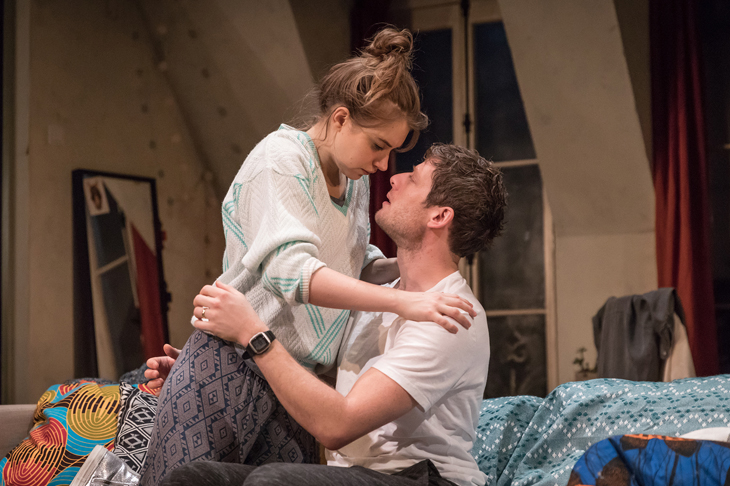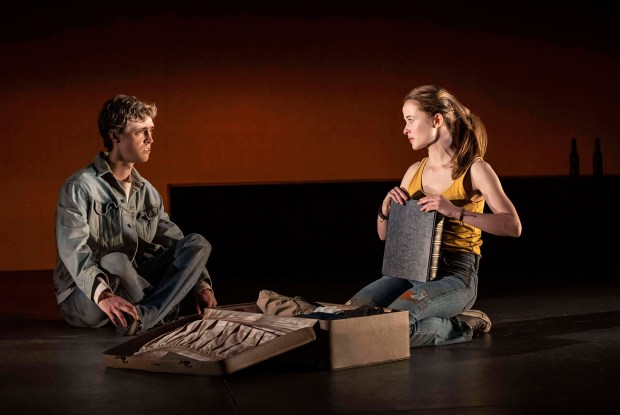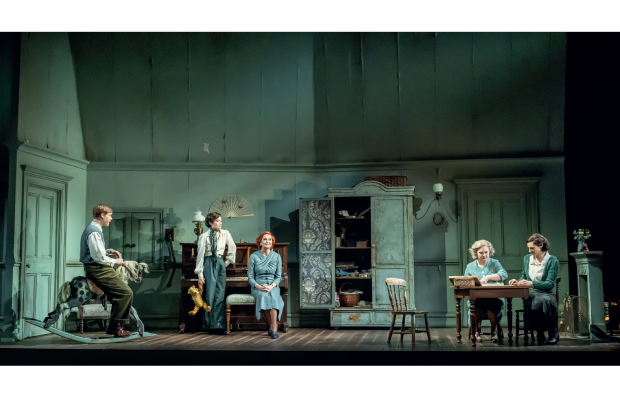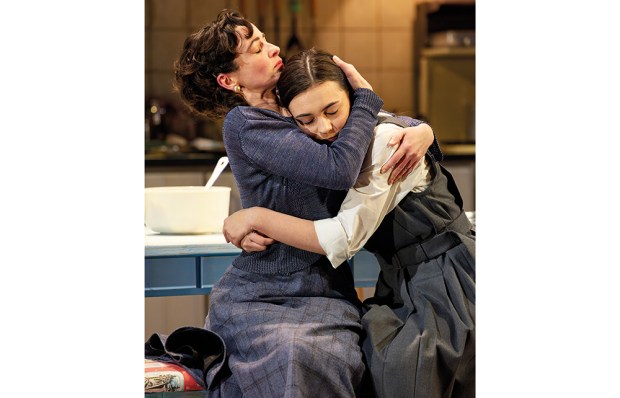A pattern emerges. A hot American playwright, dripping with prestigious awards, is honoured in London with a transfer of their best-known work. And it turns out to be all right. Not bad. Nothing special. The latest wunderkind to wow London is Amy Herzog (five plays performed, six awards received), whose marital bust-up drama Belleville is set in a glamorously derelict corner of Paris.
Abby and Zack, both 28, are newlywed Americans trying to shore up the wreckage of their European gap year. Abby wanted to learn French but has stopped attending classes. Instead, she’s studying yoga although the lessons are regularly cancelled. And her acting career seems to have stalled. She’s still grieving for her deceased mum and fretting about her pregnant sister while indulging in long, needy conversations with her widowed dad. Her husband, Zack, is a bigger mess. He works for Médecins Sans Frontières but his porn habit and his weed addiction mean that he spends most of his afternoons sprawled across the ethnic scatter cushions in a post-orgasmic daze. He’s behind with the rent and saddled with secret debts, and he keeps burning up more and more precious money in the hash pipe that he shares with his landlord. Can such a basket case really hold down a hospital job? And why hasn’t Abby spotted the looming disaster?
The script evolves as a series of revelations, of escalating severity, which eventually bring the characters crashing down. It’s one of the simplest off-the-peg designs available to a dramatist but it takes a master (like Arthur Miller in All My Sons) to prevent the play from slithering into a sequence of predictable shocks and jolts. The actors (James Norton and Imogen Poots) are sophisticated, charming and gorgeous to look at. And Herzog’s dialogue is funny and smartly observed, but this is a mid-career piece by a writer who needs to develop her craft in new directions. Alas, her trophy collection has driven her into the university system where she works as a creative writing lecturer. And once you enter the teaching business you quit the learning business. It can’t be helped. Posing as an expert before a class of beginners is bound to feed your sense of omniscience. And with each passing year, as the age gap between novice and guru widens, your estimate of your own brilliance increases. Herzog will find it impossible to explore her talent because she’s burdened with prizes that affirm her status as a maestro. These awards and honours never seem to expire. They just keep killing playwrights.
Australian writer Andrew Bovell, co-author of the 1992 movie Strictly Ballroom, has written a family melodrama, Things I Know to be True, set in an Adelaide suburb. We meet four grown-up children who can’t escape the baleful influence of their bullying, small-minded parents. Dad is a retired car mechanic. Mum is a brutally sanctimonious nurse who believes her duty is to make her children cry ‘so they understand pain’. She fulfils her responsibilities with sadistic gusto. When her teenage daughter has a fling with a Spanish criminal she torments the poor girl by revealing her humiliation to her siblings. Her eldest daughter wants to quit a loveless marriage and she pounces venomously: ‘Did some guy bored with his wife look twice at you and make you feel you were more than a mouse?’ Her son expresses a desire for a sex change and she bans him from the house. ‘When you come back as a woman I will look for the son in her face and mourn his loss,’ she says nastily. Nor is her anger confined to her kids. ‘I’d bash him to death with a back of a shovel,’ she says of her husband, ‘if I had to spend all day with him. And then I’d kill myself with boredom.’ The husband is just as charmless and hysterical. He subjects his son to a tirade for buying a ‘European car’. And when he’s accused of embezzling money, Dad’s response is to beat him up.
The play is staged with artful blandness. A blue-orange lighting scheme, the oldest platitude in the visual lexicon, is achieved with dozens of golden bulbs offset by azure accents. Each scene ends with a graceful dance that offers a welcome break from the ceaseless jabbering of the script. The play expects us to sympathise with all the characters, including the hideous parents, but it feels manipulative and partisan. The parents came of age in the 1970s when the liberalising breakthroughs of the 1960s had begun to reach the general population. It seems inconceivable that that enlightened decade could have produced such a pair of dogmatic neo-Victorian crybabies. It may flatter a younger generation to imagine that their problems — divorce, debt, gender angst —are compounded by the hostility and prejudice of their parents’ generation. But it just isn’t true.
Got something to add? Join the discussion and comment below.
Get 10 issues for just $10
Subscribe to The Spectator Australia today for the next 10 magazine issues, plus full online access, for just $10.
You might disagree with half of it, but you’ll enjoy reading all of it. Try your first month for free, then just $2 a week for the remainder of your first year.














Comments
Don't miss out
Join the conversation with other Spectator Australia readers. Subscribe to leave a comment.
SUBSCRIBEAlready a subscriber? Log in